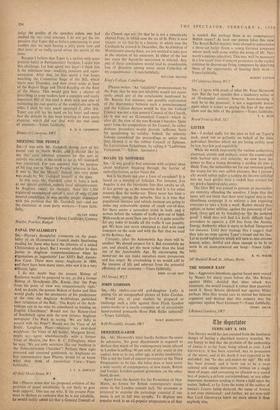Sla,—Pharos states that his proposed solution of the problem of
papal infallibility 'is not likely to gain wide support.' One can see why. If the present Pope were to declare ex cathedra that he is not infallible, he would tacitly admit ka) that a General Council of the Church can err; (b) that he is not a canonically elected Pope, in which case the see of St. Peter is now vacant; or (c) that he is a heretic, in which case the Cardinals he created in December, the Archbishop of Westminster among them, are not entitled to take part in the election of his successor. In either of the last two cases the Apostolic succession is vitiated. Any one of these conclusions would lead to considerable loss of direction among many pious Catholics of my acquaintance.—Yours faithfully,
WILLIAM REEVES King's College, Cambridge WILLIAM REEVES King's College, Cambridge
[Pharos writes: 'An "infallible" pronouncement by the Pope that he was not infallible would not neces- sarily entail any of the conclusions mentioned by Mr. Reeves. For instance, one possible explanation of the discrepancy between such a pronotincement and the Vatican decrees would be that the Vatican Council was not a true general Council of the Church, i.e.' it was not an (Ecumenical Council—which is, after all, the view of the non-Roman Churches. Quite apart from the composition of the Council, its rather dubious procedure would provide sufficient basis for questioning its validity. Indeed, the minority bishops considered the proceedings so unfair that t,hcy likened it to the robber Council of Ephesus, the Latrocinium Ephesinum, by calling it "Ludibrium Vaticanum." '—Editor, Spectator.]






































 Previous page
Previous page